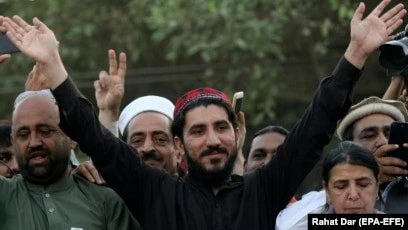PTM’s Anarchic Vision for Pakistan’s Ethnic Communities

Leading Pashtun Tahafuz Movement (PTM) activist Manzoor Ahmad Pashtun once more lambasted the Pakistani government, military, and institutions in a recent virtual address, blaming them of systematic oppression and structural cruelty against ethnic minorities, especially the Pashtuns. PTM’s Anarchic Vision for Pakistan’s Ethnic Communities Though conflict is inevitable in every democracy, the PTM’s relentless narrative offers a dangerously one-sided view of Pakistan’s complex political and security environment. It exposes the state as a monolithic tyrant and offers ethnic activity as a morally ideal opposition. Paradoxically, PTM’s rhetoric has steadily adopted anarchic overtones that undermine national institutions, increase ethnic differences, and destabilize democratic processes, so undermining the exact structure that allows the organization to survive.
Should Pakistan be a “colonial state,” as Pashtun proposes, would PTM have the freedom to name members to parliament, plan massive demonstrations in major cities, or speak before audiences overseas? PTM leaders have fully embraced Pakistan’s democratic environment, open media, civil society forums, and legal protection of political expression. PTM makes considerable use of free speech as, unlike a privilege of the deprived, it is a right provided to all individuals. Their ability for mobilization, protest, and free from systematic repressed speech highlights, despite imperfections, the way democratic values are functioning in Pakistan.
The PTM’s narrative deliberately overlooks Pakistan’s ongoing struggle against terrorism, one in which areas where most Pashtun live have regrettably suffered most. PTM tries to present government institutions as perpetual villains, therefore ignoring the simultaneous threats of extremism and militancy that have taken countless civilian and military lives. PTM creates a narrative hole that only benefits those who wish to profit from Pakistan’s internal conflict by discounting terrorism as a serious and ongoing threat. Responsibility does not operate along one-way streets. Should the state answer, so must the non-state players who have engaged in violence on the precise places PTM claims to be serving.
Furthermore, impossible to ignore certain unsettling aspects of PTM’s posture and alliances include Allegations and some evidence of foreign funding and connections together with the group’s constant silence on Tehrik-i-Taliban Pakistan (TTP) operations hint to a more nuanced, sneaky purpose. These links seriously question the movement’s loyalty to Pakistan’s national security. Activism should never be a front for surrogate objectives. Covering Pakistan’s security under the pretext of civil liberties not only compromises the people but also directly helps adversary players seeking to discredit the country from within.
Perhaps most concerning PTM’s desire for the merger of “subjugated nations,” a term that dangerously plays with secessionist language. This kind of framing gently encourages an ethno-nationalist vision that, depending on identity politics, could redrew national boundaries and hence compromise rights. Such language essentially radishes the idea by substituting a dangerously distorted image focused on past grievances instead of prospects for Pakistan as a multicultural, federal nation. It reinforces the narrative that ethnic groups must band together against the government rather than inside it, therefore tearing the fabric of the country.
Not less concerning is PTM’s raising of opposition above involvement. To get support, the movement relies increasingly on hashtags, slogans, and social media virality rather than on constitutional platforms and institutional processes applied to bring about reforms. While digital activism has great worth, actual progress comes from engaging with institutions, courts, parliaments, and bureaucracies, not from mindless hate of them. Ignoring these routes not only denigrates the very tools meant to achieve justice but also encourages an anti-system attitude promoting instability.
PTM’s relentless campaign to discredit Pakistan’s media, parliament, and court also reveals a purposeful aim to erode public confidence in national institutions. These institutions do have flaws, though. Still, they also depict the only path major change may follow. Presenting these sectors as irreparably compromised runs PTM the risk of convincing a generation of people that reform is unattainable inside the system. Not freeing, this kind of nihilism is destructive. Change calls for trust in the democratic process as much as disagreement; it also requires patience and participation.
PTM also does a strategic mistake by turning every political dispute into an ethnic grievance. Issues with Pakistani government stretch beyond one ethnicity or one province. Communities of Baloch, Sindhi, Punjabi, even Urdu-speaking people have battled with justice, representation, and resource distribution. Presenting any shortfall as a conspiracy against Pashtuns compromises not just the facts but also the idea of national unity. Pakistan’s strength is in its diversity; real answers come from building bridges instead of from burning them.
The PTM must understand that if every government activity is branded as oppression, the very concept of national security becomes unsustainable. How can our nation discern between acceptable security regulations and actual persecution? How can we protect the people from the threat’s foreign proxies, militancy, and disinformation operations bring forth? Any sovereign state has a fundamental responsibility for national security; it is not dictatorship. Acting opposite entails intellectual dishonesty and political peril.
The PTM is at a junction. It can stay on its current path, magnifying grievances and fostering division under the cover of rights, or it can become a weapon for political change supporting Pakistan’s unity under cover of rights. Though audacious, the choice is necessary. Real leadership lies in the ability to criticize while building, challenge without separating, question injustice without sacrificing the idea of a shared nationhood.
PTM’s current path veers more toward anarchic disturbance than toward intentional advocacy. Though many find the narrative emotionally compelling, it lacks balance and responsibility. It ignores the freedoms it exploits from the sacrifices made by others as well as the complex reality of Pakistani administration and security. Doing this runs the risk of turning sincere criticism into deadly division. Reformers, not wreckers, leaders who will challenge the system to grow rather than destroy Pakistan needs. Unity instead of disintegration is the only path ahead.












